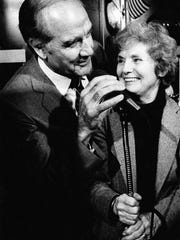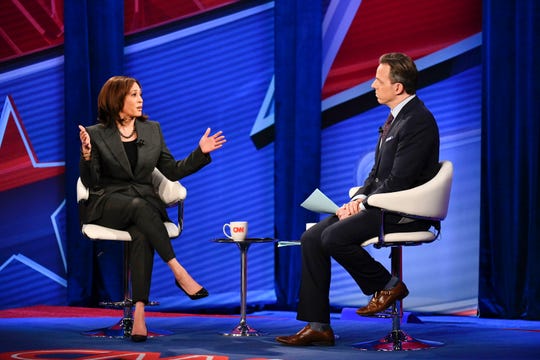Results 1 to 1 of 1
Thread Information
Users Browsing this Thread
There are currently 1 users browsing this thread. (0 members and 1 guests)
-
01-30-2019, 08:35 PM #1
California's primary could pose an existential threat to Iowa's caucuses
California's primary could pose an existential threat to Iowa's caucuses. Or it could make them more important.
Brianne Pfannenstiel, Des Moines Register
Published 2:20 p.m. CT Jan. 30, 2019
A brief history on why Iowa's caucuses matter to the presidential nominating process. Jason Noble, jnoble2@dmreg.com
One year from Sunday — after all the ads have been aired, the 99-county tours have been completed and there’s nothing left to do but decide — Iowans will gather in school gymnasiums and church basements across the state to caucus.
Since the 1970s, Iowans have cast the first votes in the presidential nominating races. But this year, as first-in-the-nation Iowans are making their presidential preferences known, so will voters in California.
California moved up its primary date to March 3, 2020 — still technically a month later than Iowa's prized caucuses. But because of its robust early-voting programs, Californians can begin casting their ballots the same day Iowans caucus: Feb. 3, 2020.
That represents something of an existential threat to the Iowa caucuses — or maybe a boon to them, depending on whom you ask.
The effect could be a dramatic decline in influence for early-voting states like Iowa, which have wielded outsize clout in the presidential nominating process. Candidates might choose to forgo Iowa in favor of campaigning in California, where the population is far more diverse and the reward — at least in terms of available delegates — is far greater.
"Candidates will not be able to ignore the largest, most diverse state in the nation," California Secretary of State Alex Padilla said when the change was made.
But some Iowa caucus experts, who have become used to doomsayers perennially predicting their downfall, take a rosier view.
“I think that when you front-load the calendar with a bunch of delegate-rich states, I do think that it actually makes these early contests even that much more important,” said Iowa Democratic Party Chairman Troy Price. He said the boost a candidate could get from doing well in the caucuses is invaluable — particularly for those who won't have the resources to compete in California.
“There’s just going to be so much earned media that comes out of the process, that comes out of Iowa,” he said.
Iowa matters because it's first
There’s one thing, above all others, that gives Iowa its significance when it comes to nominating presidents: It comes first. So when other states make moves that could potentially threaten that first-in-the-nation status, Iowans pay attention.

Presidential candidate George McGovern, accompanied by his wife Eleanor, greets a crowd in 1983 as he opened his official campaign headquarters in downtown Des Moines. (Photo: Register file photo)
Iowa has had the first say since 1972, and political prognosticators have looked to the results since then for insights about candidates, campaigns and the nation's political climate.
That year, South Dakota Sen. George McGovern, a Democrat, came unexpectedly close to toppling perceived front-runner and establishment favorite Ed Muskie, a U.S. senator from Maine. Though McGovern didn’t win the Iowa caucuses, it showed that Muskie wasn’t as strong as had been generally thought — an observation that seemed prescient in hindsight after McGovern went on to clinch the Democratic nomination.
Then in 1976, Jimmy Carter, the former governor of Georgia, built a grassroots campaign in Iowa, over-performed expectations in the caucuses and went on to win the nomination and then the presidency.
Iowa's results acted as a springboard to launch Carter out of obscurity as he went on to compete in other states. Candidates have sought to replicate that Iowa-launched path to the White House ever since.
► More: How the Iowa caucuses came to be
A boost for lesser-known candidates
Iowa's springboard potential could become critical to lesser-known candidates who don’t have the financial resources to compete in the much more expensive political field of California, said Josh Putnam, a lecturer at the University of North Carolina-Wilmington who tracks the presidential primary process through a blog called
FrontloadingHQ.
"To the extent we’re going to see folks begin to focus on California, it’s going to be folks that have the resources to do that," he said.
California, of course, is large. It encompasses more than 163,000 square miles compared to Iowa’s 56,000 and is home to nearly 40 million people compared to Iowa’s 3 million. That means campaigning there is done mostly through television and large-scale events rather than the retail, door-to-door campaign style Iowa’s caucuses have become known for.
Some candidates, particularly Sen. Kamala Harris, who is from Oakland and served as California’s attorney general before being elected to the U.S. Senate, will have natural inroads into California — both with its voters and its high-dollar donors.
 Sen. Kamala Harris speaks with CNN's Jake Tapper on Monday, Jan. 28, 2019, during a town-hall meeting held at Drake University in Des Moines. (Photo: Edward M. Pioroda/CNN/Special to the Register)
Sen. Kamala Harris speaks with CNN's Jake Tapper on Monday, Jan. 28, 2019, during a town-hall meeting held at Drake University in Des Moines. (Photo: Edward M. Pioroda/CNN/Special to the Register)
► Get Iowa politics news in your inbox:Subscribe to our free newsletter.
Pundits have speculated that Harris might choose a strategy focusing more attention on her home state than on Iowa, though she spent time here ahead of the 2018 midterms and immediately scheduled a CNN-hosted town hall in Des Moines after announcing her exploratory committee.
Democratic strategist Matt Paul noted that past candidates have skipped Iowa to their own peril.
“Look at 'President' Giuliani,” he said.
Republican Rudy Giuliani, who ran in 2008, chose not to compete heavily in Iowa in favor of focusing on larger states that vote later in the process, such as Florida.
“We've got 29 primaries and caucuses. We put in proportionate time in each," Giuliani said in a Jan. 3, 2008, CNN interview, according to a transcript. "And I think, as we move along, you're going to see that that strategy really pays off, in that we've paid a lot of attention to states that some other candidates haven't paid as much attention to."

From Aug. 16, 2007: Then-U.S. Sen. and Democratic presidential candidate Barack Obama and his youngest daughter, Sasha, driving a bumper car together while Michelle Obama, left, and their oldest daughter, Malia, right, drive their own cars at the Iowa State Fair. (Photo: Register file photo)
Giuliani, of course, did not win his party's nomination or become president that year. He didn't build strong ground organizations in early states like Iowa, where he finished sixth, and New Hampshire, where he came in fourth, and dropped out of the race after a third-place finish in Florida.
Instead, it was Democrat Barack Obama whose clear Iowa strategy helped establish him as a serious contender.
“The caucuses carry with them tremendous political inertia and momentum,” Paul said.
Candidates who do well in Iowa get an immediate boost as the results are reported out with blanket media coverage. Though California's early voting begins the same day as Iowa's caucuses, Paul noted, the results will come much later.
"Are the Iowa caucuses perfect? No. Are they valuable? Yes," he said.
Price said that competing in a state like Iowa, which supported Obama twice in the general election before flipping in favor of Donald Trump in 2016, will help prepare candidates to compete in other Midwest and Rust Belt states that Trump won.
“It’s one of the reasons why I think that Iowa having the role that it does is going to help make our candidates stronger going into the general election,” he said.
Candidates still flocking to Iowa
For now, the change in the nominating calendar hasn’t slowed the rush of presidential hopefuls into Iowa.
Elizabeth Warren, a senator from Massachusetts, speaks to a crowd of people on Saturday, Jan. 5, 2019, in Des Moines, just days after forming a presidential exploratory committee. This was her first trip to Iowa since 2014. (Photo: Kelsey Kremer/The Register)
“I hesitate to say, 'Look, it’s too early to know (how all this will affect Iowa).' It’s not,” Putnam said.
“Candidates are doing things now. And the things they’re doing now tend to indicate they’re doing the kind of traditional things of going to Iowa and New Hampshire.”
Massachusetts Sen. Elizabeth Warren became the first top-tier candidate to formalize her presidential exploratory committee Dec. 31. The next day she confirmed plans for a three-day, five-stop tour of Iowa.
New York Sen. Kirsten Gillibrand announced the formation of her exploratory committee on a Tuesday and three days later was standing in a Sioux City coffee shop mingling with Iowans.
Entrepreneur Tom Steyer even came to Iowa to announce he would not run for president.
And a group hoping to draft Texan Beto O’Rourke into the race showed up to a Des Moines pub with no candidate at all, just to talk politics with would-be caucusgoers.
https://www.desmoinesregister.com/st...is/2688021002/
NO AMNESTY
Don't reward the criminal actions of millions of illegal aliens by giving them citizenship.
Sign in and post comments here.
Please support our fight against illegal immigration by joining ALIPAC's email alerts here https://eepurl.com/cktGTn
Similar Threads
-
From Russian Bolsheviks to American Socialists | poses the existential threat to our
By Airbornesapper07 in forum Other Topics News and IssuesReplies: 0Last Post: 10-23-2018, 07:22 PM -
Top General Says Mexico Border Security Now ‘Existential’ Threat to U.S.
By JohnDoe2 in forum illegal immigration News Stories & ReportsReplies: 2Last Post: 08-20-2017, 12:55 AM -
Is the United States Facing an ‘Existential Threat’ On Its Southern Border?
By Jean in forum illegal immigration News Stories & ReportsReplies: 0Last Post: 07-30-2015, 02:33 PM -
America's existential threat
By FedUpinFarmersBranch in forum illegal immigration News Stories & ReportsReplies: 1Last Post: 03-15-2010, 02:49 PM -
Barak: Iran not existential threat to Israel
By carolinamtnwoman in forum Other Topics News and IssuesReplies: 1Last Post: 09-19-2009, 01:52 AM


 LinkBack URL
LinkBack URL About LinkBacks
About LinkBacks




 Reply With Quote
Reply With Quote


Predicted consequences of Biden’s planned invasion, comes to...
04-15-2024, 02:01 PM in General Discussion